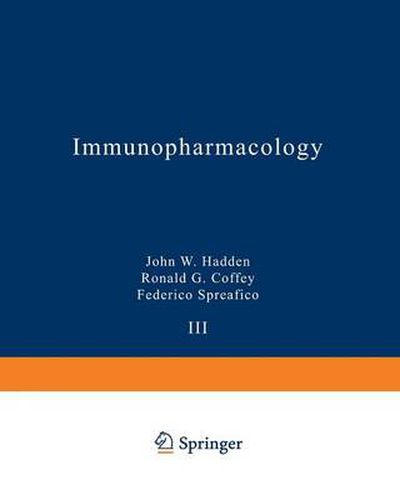Readings Newsletter
Become a Readings Member to make your shopping experience even easier.
Sign in or sign up for free!
You’re not far away from qualifying for FREE standard shipping within Australia
You’ve qualified for FREE standard shipping within Australia
The cart is loading…






This title is printed to order. This book may have been self-published. If so, we cannot guarantee the quality of the content. In the main most books will have gone through the editing process however some may not. We therefore suggest that you be aware of this before ordering this book. If in doubt check either the author or publisher’s details as we are unable to accept any returns unless they are faulty. Please contact us if you have any questions.
Immunopharmacology: A New Discipline of Immense Potential Among the looming triumphs of the biologic revolution is the rapidly developing understanding of the mechanisms of bodily defense. In the short span of 35 years, knowledge of immunologic machinery has progressed from crudest description to major understanding in cellular and molecular terms. Antibodies, immunoglobulins, and the complement system have been almost completely defined in detailed molecular terms. Organs, like thymus, spleen and lymph nodes-so long enigmatic black boxes-are beginning to be understood not only in cellular terms but in molecular, physiologic, and endocrinologic terms. With this surging new information about the immune system comes the possi bility of developing a pharmacology which can modulate and control immunologic functions. Immunopharmacology most broadly conceived must address (1) control of development and function of the cellular components of the immunologic appara tus; (2) facilitation and suppression of function of the immunologically competent cells of the several subclasses, like T helpers, suppressors, and effectors, and B effectors and suppressors; (3) manipulation and repair of the major biologic amplifi cation systems, e. g. , the complement system and kinin-kallikrein system, and (4) utilization, modulation, and inhibition of the galaxy of molecules generated by T lymphocytes, the lymphokines. This new pharmacology must deal with the funda mental effector mechanisms of immunity, namely inflammation, phagocytosis, vascular reactivity, and blood coagulation. Furthermore, immunopharmacology must address and manipulate cell-cell communication and interaction, so vital to control of the immunological apparatus.
$9.00 standard shipping within Australia
FREE standard shipping within Australia for orders over $100.00
Express & International shipping calculated at checkout
This title is printed to order. This book may have been self-published. If so, we cannot guarantee the quality of the content. In the main most books will have gone through the editing process however some may not. We therefore suggest that you be aware of this before ordering this book. If in doubt check either the author or publisher’s details as we are unable to accept any returns unless they are faulty. Please contact us if you have any questions.
Immunopharmacology: A New Discipline of Immense Potential Among the looming triumphs of the biologic revolution is the rapidly developing understanding of the mechanisms of bodily defense. In the short span of 35 years, knowledge of immunologic machinery has progressed from crudest description to major understanding in cellular and molecular terms. Antibodies, immunoglobulins, and the complement system have been almost completely defined in detailed molecular terms. Organs, like thymus, spleen and lymph nodes-so long enigmatic black boxes-are beginning to be understood not only in cellular terms but in molecular, physiologic, and endocrinologic terms. With this surging new information about the immune system comes the possi bility of developing a pharmacology which can modulate and control immunologic functions. Immunopharmacology most broadly conceived must address (1) control of development and function of the cellular components of the immunologic appara tus; (2) facilitation and suppression of function of the immunologically competent cells of the several subclasses, like T helpers, suppressors, and effectors, and B effectors and suppressors; (3) manipulation and repair of the major biologic amplifi cation systems, e. g. , the complement system and kinin-kallikrein system, and (4) utilization, modulation, and inhibition of the galaxy of molecules generated by T lymphocytes, the lymphokines. This new pharmacology must deal with the funda mental effector mechanisms of immunity, namely inflammation, phagocytosis, vascular reactivity, and blood coagulation. Furthermore, immunopharmacology must address and manipulate cell-cell communication and interaction, so vital to control of the immunological apparatus.